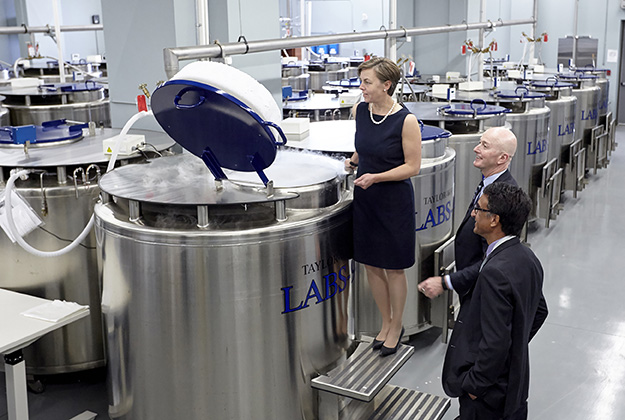Federal government recognizes CLSA for reaching 50,000 participants

On a tour of the Biorepository and Bioanalysis Centre, CLSA lead principal investigator Parminder Raina shows Minister of Labour Kellie Leitch and Member of Parliament David Sweet the cryofreezers which are used to store CLSA biospecimens.
The Canadian Longitudinal Study on Aging’s (CLSA) milestone of reaching its ambitious recruitment goal of 50,000 Canadian participants was formally recognized by the Government of Canada during a Monday gathering at McMaster Innovation Park.
Minister of Labour Kellie Leitch and Member of Parliament David Sweet, representing Minister of Health Rona Ambrose, were on hand to congratulate leaders from the CLSA and McMaster, and to thank the Canadians from coast to coast who are taking part in the national, long-term study that will follow participants for 20 years.
The CLSA, the most comprehensive study of aging ever undertaken in Canada, is a strategic initiative of the Canadian Institutes of Health Research (CIHR), which recently provided an additional $41.6 million to allow the study to continue for the next five years.
This brings its total contribution to $65.1 million. The Canada Foundation for Innovation has contributed an additional $10 million.
The government officials met with CLSA lead principal investigator Parminder Raina, co-principal investigator Susan Kirkland from Dalhousie University, and Susan Denburg, associate vice-president academic in McMaster’s Faculty of Health Sciences, as well as a few local participants, to learn more about the study, offer their congratulations to the research team, and thank the participants from across the country for agreeing to take part in this important initiative.
“Our Government is proud to invest in this groundbreaking research project that will help us to improve the quality of life for aging Canadians and future generations,” said Leitch, MP for Simcoe-Grey, Minister responsible for the Status of Women, and a pediatric orthopedic surgeon.
“Congratulations to the CLSA team on their progress to date, and thanks to all Canadians participating in this important national effort on healthy aging.”
Launched in 2010, the CLSA is following participants from all 10 provinces, aged 45 to 85 at recruitment, to collect a wide range of information about the changing biological, medical, psychological, social, lifestyle and economic aspects of people’s lives.
They will be revisited once every three years to carry out complete data collection, and contacted at regular intervals to touch base and maintain engagement with the study.All participants have now completed baseline assessments through telephone interviews, or face-to-face interviews followed by visits to specially designed data collection sites.
“Reaching the milestone of recruiting 50,000 participants from across the country is testament not only to the dedication of our staff and researchers, but also to the importance of this study among Canada’s population,” said Raina.
“The fact that so many Canadians are willing to devote their time over the course of 20 years to help the CLSA achieve its goal of better understanding the aging process is remarkable. Each and every participant is contributing to our collective ability to understand how we age, and ultimately create new knowledge to create better health for all.”
Over the past five years, the CLSA research team has implemented the study and completed recruitment. More than 160 researchers from 26 Canadian universities with expertise in biology, genetics, clinical research, social sciences, economics, epidemiology and population health are involved in the CLSA. The CLSA employs more than 250 people across Canada, who are working on study implementation and data collection.
The CLSA team is now working on launching the first follow-up, and participants will be contacted again for data collection beginning in early July.
For more details on the CLSA, visit the website: https://www.clsa-elcv.ca/

